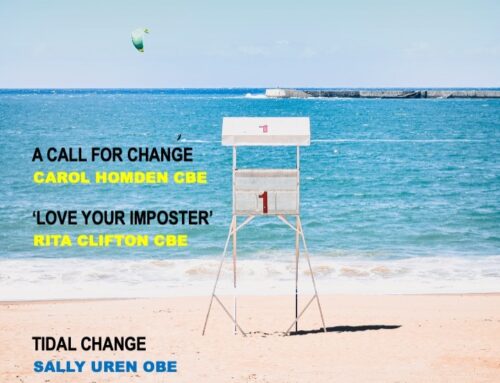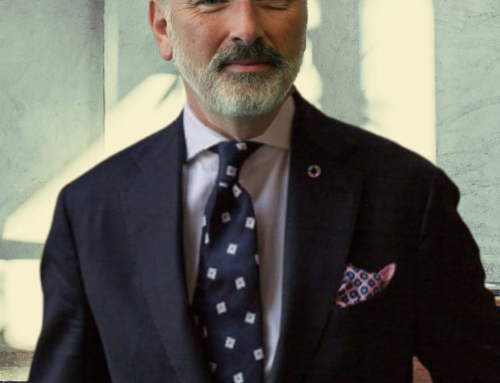Doing the Right Thing
In a crisis, drawing on credit in the reputational bank can be expensive, but doing the right thing will make your resources go further
It often takes a dramatic life event to jolt people into refocusing on what’s important. To regain some perspective. And if we are going to take anything from the coronavirus crisis, whenever it eases, I hope it is a moment of epiphany when we remember that the precondition for truly achieving the trust of those who rely upon us is the responsibility we take for the decisions we make.
In the context of the current crisis environment, this responsibility translates into a profound question: when you look back on the way you handled the crisis, did you do the right thing?
This isn’t future gazing. The crisis is unfolding at breath-taking speed and by the time it passes, and the markets come back to life, it will be too late. Those who have been seen to have done the right thing will have a once-in-a-generation opportunity to position themselves as a force for good both for their external audiences and, crucially, also for their own people.
Not only is the answer to this question likely to be a fundamental reputational driver in the short term, but also further ahead as the horizon brightens.
It is a powerful point of reflection for business: if responsibility – in the truest sense – wasn’t at the forefront of your organisational values and beliefs, it simply must be now. Because for all organisations, responsibility stretches across all important audience groups, internal and external, and will be gauged in aggregate on your propensity to doing the right thing by them all. And an important product of that sense of responsibility, as we are increasingly seeing, is a higher degree of brand affinity when consumers come to purchasing decisions.
As the UK was placed into lockdown, John Cronin, analyst at brokers Goodbody, wrote to clients that “it will become socially unacceptable to return capital to shareholders until the full extent of the crisis is known”. The classic profit versus purpose conundrum writ large, but in the current context, I think this taps into a larger, deeper point.
If we’re all in this together, then we need to be all in. No half measures; nothing off the table. In the parlance of the UK government, whatever it takes. And in an environment where there are no winners, but potentially plenty of losers, resources need to be collectively directed towards a unified end: preserving as much social and economic strength so that when the rebound comes, as it surely will, the recovery is shared.
At the same time, the old adage that actions speak louder than words is particularly true when communicating in a crisis. If you have a stated commitment to achieving a particular outcome, then be prepared to back it up with evidence that you’re following through. The key is to draw on what you do best and identify how it can be deployed in a way that serves the needs of all of the communities that rely on you.
Take Project Pitlane, a collaboration between the seven UK-based Formula 1 teams, has delivered striking progress in accelerating the delivery of ventilation devices, harnessing their unparalleled depth of capabilities in acute design, engineering and advanced manufacturing to expedite the delivery of a technology that has never been needed more urgently. The same is true of a consortium comprising five Cambridge-based advanced technology businesses, one of which, Cambridge Consultants, is a Ketchum client (full disclosure), which have come together to develop and manufacture ventilators bound for the NHS front line.
It’s equally true for employees. The cacophony of media stories about the economic impact of the virus only contributes more uncertainty to an already anxiety-inducing situation. But people are resilient, and respond constructively to open, honest and genuine communication from their leaders. There is no good way to deliver difficult decisions, but there are plenty of bad ways. In my own experience, a very significant restructuring within a global technology business was perceived to have been handled sensitively and compassionately, which maintained goodwill among those affected and within third parties. That was about putting in place the right support mechanisms, the right processes and communicating the news to colleagues with empathy and honesty. As Ajay Banga, CEO of Mastercard, reiterated at Davos this year, doing the right thing “requires something very basic: decency”.
However, it bears repeating that the best position from which to respond to a crisis is on the front foot. From a defensive position the situation can begin to become overwhelming as you struggle to recover from slow responses or mis-steps in the early stages of a crisis. The UK Government is learning this lesson every day in the face of mounting pressure over virus testing and the provision of protective equipment for front line health professionals. A week is a long time in politics; but an eternity in a crisis.
At Ketchum, our philosophy is rooted in a three-step process: Prepare – Respond – Recover. While it is true that no two crises are the same, there are some consistent characteristics among scenarios. So this process serves as a guiding principle for the way communications surrounding a crisis should be structured but, crucially, also operationalises the behaviours required to maintain the right level of alertness and readiness for an organisation and its leaders to respond consistently, in real-time and in a way that addresses the needs of all concerned audiences. It’s about equipping your people, professionally and practically, to respond as it is getting the right processes in place.
The coronavirus crisis is unprecedented in terms of its scale, speed and intensity, but also in its complexity. It affects every human being on the planet and in liberal markets it means striking an uncomfortable balance between maintaining public safety and imposing restrictions on freedom unseen in some countries for more than half a century. But they are necessary and impose a responsibility not only on lawmakers and decision-makers, but also on citizens, to do the right thing in the interests of a broader community.
No-one ever said that doing the right thing was always meant to be easy. The myriad pressures on leaders during this crisis will be profound and the road to recovery will be hard. But making decisions in the interests of those who rely on you will mean that when you need your people and your supporters most, they’ll be with you during these turbulent moments and into the brighter times ahead.
Jamie Robertson
Managing Director | Corporate Reputation
https://www.ketchum.com/

Doing the Right Thing
In a crisis, drawing on credit in the reputational bank can be expensive, but doing the right thing will make your resources go further
It often takes a dramatic life event to jolt people into refocusing on what’s important. To regain some perspective. And if we are going to take anything from the coronavirus crisis, whenever it eases, I hope it is a moment of epiphany when we remember that the precondition for truly achieving the trust of those who rely upon us is the responsibility we take for the decisions we make.
In the context of the current crisis environment, this responsibility translates into a profound question: when you look back on the way you handled the crisis, did you do the right thing?
This isn’t future gazing. The crisis is unfolding at breath-taking speed and by the time it passes, and the markets come back to life, it will be too late. Those who have been seen to have done the right thing will have a once-in-a-generation opportunity to position themselves as a force for good both for their external audiences and, crucially, also for their own people.
Not only is the answer to this question likely to be a fundamental reputational driver in the short term, but also further ahead as the horizon brightens.
It is a powerful point of reflection for business: if responsibility – in the truest sense – wasn’t at the forefront of your organisational values and beliefs, it simply must be now. Because for all organisations, responsibility stretches across all important audience groups, internal and external, and will be gauged in aggregate on your propensity to doing the right thing by them all. And an important product of that sense of responsibility, as we are increasingly seeing, is a higher degree of brand affinity when consumers come to purchasing decisions.
As the UK was placed into lockdown, John Cronin, analyst at brokers Goodbody, wrote to clients that “it will become socially unacceptable to return capital to shareholders until the full extent of the crisis is known”. The classic profit versus purpose conundrum writ large, but in the current context, I think this taps into a larger, deeper point.
If we’re all in this together, then we need to be all in. No half measures; nothing off the table. In the parlance of the UK government, whatever it takes. And in an environment where there are no winners, but potentially plenty of losers, resources need to be collectively directed towards a unified end: preserving as much social and economic strength so that when the rebound comes, as it surely will, the recovery is shared.
At the same time, the old adage that actions speak louder than words is particularly true when communicating in a crisis. If you have a stated commitment to achieving a particular outcome, then be prepared to back it up with evidence that you’re following through. The key is to draw on what you do best and identify how it can be deployed in a way that serves the needs of all of the communities that rely on you.
Take Project Pitlane, a collaboration between the seven UK-based Formula 1 teams, has delivered striking progress in accelerating the delivery of ventilation devices, harnessing their unparalleled depth of capabilities in acute design, engineering and advanced manufacturing to expedite the delivery of a technology that has never been needed more urgently. The same is true of a consortium comprising five Cambridge-based advanced technology businesses, one of which, Cambridge Consultants, is a Ketchum client (full disclosure), which have come together to develop and manufacture ventilators bound for the NHS front line.
It’s equally true for employees. The cacophony of media stories about the economic impact of the virus only contributes more uncertainty to an already anxiety-inducing situation. But people are resilient, and respond constructively to open, honest and genuine communication from their leaders. There is no good way to deliver difficult decisions, but there are plenty of bad ways. In my own experience, a very significant restructuring within a global technology business was perceived to have been handled sensitively and compassionately, which maintained goodwill among those affected and within third parties. That was about putting in place the right support mechanisms, the right processes and communicating the news to colleagues with empathy and honesty. As Ajay Banga, CEO of Mastercard, reiterated at Davos this year, doing the right thing “requires something very basic: decency”.
However, it bears repeating that the best position from which to respond to a crisis is on the front foot. From a defensive position the situation can begin to become overwhelming as you struggle to recover from slow responses or mis-steps in the early stages of a crisis. The UK Government is learning this lesson every day in the face of mounting pressure over virus testing and the provision of protective equipment for front line health professionals. A week is a long time in politics; but an eternity in a crisis.
At Ketchum, our philosophy is rooted in a three-step process: Prepare – Respond – Recover. While it is true that no two crises are the same, there are some consistent characteristics among scenarios. So this process serves as a guiding principle for the way communications surrounding a crisis should be structured but, crucially, also operationalises the behaviours required to maintain the right level of alertness and readiness for an organisation and its leaders to respond consistently, in real-time and in a way that addresses the needs of all concerned audiences. It’s about equipping your people, professionally and practically, to respond as it is getting the right processes in place.
The coronavirus crisis is unprecedented in terms of its scale, speed and intensity, but also in its complexity. It affects every human being on the planet and in liberal markets it means striking an uncomfortable balance between maintaining public safety and imposing restrictions on freedom unseen in some countries for more than half a century. But they are necessary and impose a responsibility not only on lawmakers and decision-makers, but also on citizens, to do the right thing in the interests of a broader community.
No-one ever said that doing the right thing was always meant to be easy. The myriad pressures on leaders during this crisis will be profound and the road to recovery will be hard. But making decisions in the interests of those who rely on you will mean that when you need your people and your supporters most, they’ll be with you during these turbulent moments and into the brighter times ahead.
Jamie Robertson
Managing Director | Corporate Reputation
https://www.ketchum.com/




